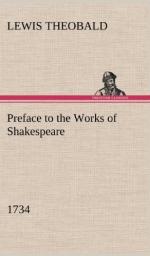INTRODUCTION
Lewis Theobald’s edition of Shakespeare (1734) is one cornerstone of modern Shakespearian scholarship and hence of English literary scholarship in general. It is the first edition of an English writer in which a man with a professional breadth and concentration of reading in the writer’s period tried to bring all relevant, ascertainable fact to bear on the establishment of the author’s text and the explication of his obscurities. For Theobald was the first editor of Shakespeare who displayed a well grounded knowledge of Shakespeare’s language and metrical practice and that of his contemporaries, the sources and chronology of his plays, and the broad range of Elizabethan-Jacobean drama as a means of illuminating the work of the master writer. Thus both in the edition itself and in his Preface, which stands as the first significant statement of a scholar’s editorial duties and methods in handling an English classic, Theobald takes his place as an important progenitor of modern English studies.
It is regrettable, though it was perhaps historically inevitable, that this pioneer of English literary scholarship should have been tagged “piddling Theobald” by Pope and crowned the first king of The Dunciad. Pope’s edition of Shakespeare was completed by 1725, and in the following year Theobald made the poet his implacable enemy when he issued his Shakespeare Restored, which demolished Pope’s pretensions as an editor by offering some two hundred corrections. But the conflict was not merely strife between two writers: it was a clash between two kinds of criticism in which the weight of tradition and polite taste were all on the side of Pope. What Theobald had done, in modern terms, was to open the rift between criticism and scholarship or, in eighteenth-century terms, to proclaim himself a “literal critic” and to insist upon the need for “literal criticism” in the understanding and just appreciation of an older writer. The new concept, which Theobald owed largely to Richard Bentley as primate of the classical scholars, was of course the narrower one—implicit in it was the idea of specialization—and Theobald’s opponents among the literati were quick to assail him as a mere “Word-catcher” (cf. R.F. Jones, Lewis Theobald, 1919, p. 114).
His own edition of Shakespeare, therefore, was the work of a man and a method on trial. At first Theobald had proposed simply to write further commentary on Shakespeare’s plays, but by 1729 he determined to issue a new edition and in October of that year signed a contract with Tonson. From the first Theobald found warm support for his project among booksellers, incipient patrons, and men of learning. His work went forward steadily; subscribers, including members of the Royal Family, were readily forthcoming; and by late 1731 Theobald felt that his labors were virtually complete. But vexing delays occurred in the printing so that the edition, though dated 1733, did not appear until early in 1734, New Style. When it did appear, it was plain to all that Theobald’s vindication of himself and his method was complete. Judicious critics like the anonymous author of Some Remarks on the Tragedy of Hamlet (1736) were quick to applaud Theobald’s achievement, and even Pope himself was silenced.




